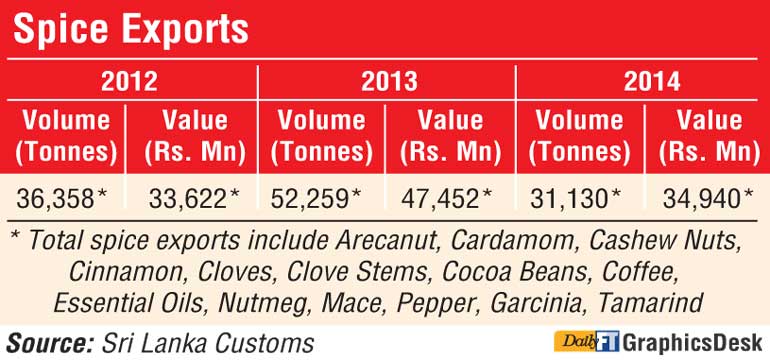Saturday Feb 21, 2026
Saturday Feb 21, 2026
Thursday, 31 December 2015 00:20 - - {{hitsCtrl.values.hits}}

By Charumini de Silva
Spice traders yesterday expressed disappointment over the Government’s decision to retain the Cess imposed on bulk exports, deviating from the original 2016 Budget proposal to remove it.
Spices and Allied Products Producers and Traders Association (SAPPTA) Founder Chairman Gulam Chatoor said the industry was dissatisfied with the decision to roll back the Budget proposal to remove the Cess imposed on spices.
Bland...
“We were very keen when Budget 2016 proposed for the removal of export tax on spices. We only requested to do away with the Cess as it would have a positive impact on production and on productivity, but this is disappointing,” he told the Daily FT.
Initially while presenting the Budget proposal 2016 Finance Minister Ravi Karunanayake said: “To encourage export of spices, cesses imposed on, pepper, cloves and nutmeg will be removed.”
Since the Minister presented the Budget, the Government has amended several revenue proposals.
Noting that the proposal made by the Government to allocate Rs. 150 million for branding and Rs.50 million for research was praiseworthy, Chatoor questioned as to why producers must back the Cess fund, when the Government has already allocated Rs. 150 million from the Treasury pointing out they could use part of that fund for value addition.
A SAPPTA Former Chairman, M.C.M. Zarook said: “The CESS fund has done nothing for the industry and funds collected over the years have been transferred to the Treasury. We are disgusted of what is happening and what is going to happen.”
He said that during the discussions held with the EDB the new Chairperson Indira Malwatte was keen on taking the fund under the purview of EDB to monitor and reward the value adding stakeholders.
However, highlighting on the challenges exporters face in terms of tapping into international markets he said EDB is only looking at the matter from the surface and is mainly going by the books, where as the stakeholders are much more practical in attracting foreign exchange to the country.
“We have catered to the international market, but it is very difficult to sustain in that market with relatively low earnings. How is the value addition going to be profitable for Sri Lanka? Who will assure of a market for the exporters to sell their value added products? EDB does not understand the marketing aspect of products in the international arena and they are not looking at the long term perspective of it,” Zarook stressed.
EDB Chairperson Indira Malwatte said that the decision was made to encourage value added exports and to enhance the manufacturing industry.
“There is no change, the Cess will be added on all bulk exports,” she confirmed.
She went on to say that the objective was to increase the export earnings via value added products.
Exporting products in their raw form is a major drawback in the sector, she asserted, adding it was timely for the stakeholders to uplift their productivity by engaging in value added products in the forms of powder, essential oils and perfumeries.
“Sri Lanka has the right mix of products, talent and workforce to move onto the next level, but the stakeholders are just comfortable continuing to export spices in its raw form without putting that extra effort,” Malwatte explained.